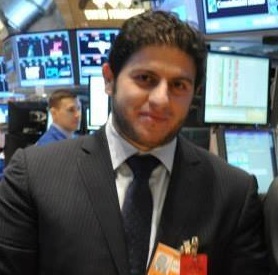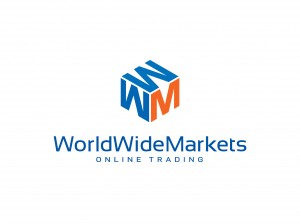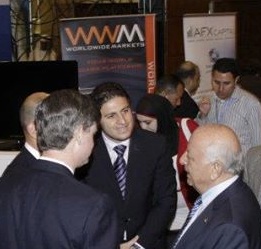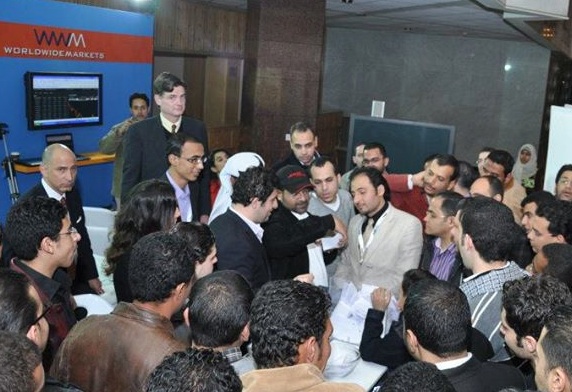
“Meet The Experts” reached out to one of the most distinguished FX specialists in the Middle East, Bassam Maalouf, Executive Vice President of WorldWideMarkets, for his exclusive perspective on the region’s FX prospects and future.
Mr. Maalouf is no stranger to the Forex industry, having served in a multitude of senior management roles at both WorldWideMarkets and FX Solutions. His extensive experience in the Middle East, which includes such locales as Dubai, Kuwait, Riyadh and Istanbul, has helped him become an advocate for the region, and truly an expert in his craft.
1. Do you think Forex brokers hesitate when approaching the Middle East from a retail client business perspective?
It is a different language and different culture. Historically, there are few firms that have approached this region, however, this worked out for us. Many firms were hesitant to come here because they were so successful in other regions around the world. When I think back to 9 years ago, when I was working at FX Solutions; we had the opportunity to be a market leader and enter the Middle East.

We seized that opportunity and it turned out to be an extremely successful endeavor for FX Solutions and that continued success is carried on through the initiatives we are spearheading at WorldWideMarkets in the Middle East. In honesty, once other firms found how successful we were in the region they began to take an interest in the region and some established offices here. The UAE and in particular, Dubai, is one of the most conducive markets for business in the region.
At the same time you have the proximity to the rest of the Arabic World, Turkey, India and Pakistan; the UAE is a hub for so many firms. There are many other factors that continue to add to the business appeal of this region day by day. The market is consolidating and there are fewer firms in business today than 9 years ago. However, this has had a positive effect for Forex retail clients as firms like WorldWideMarkets compete for business. We also see the depth and breadth of our client base increasing as more people learn about Forex as an alternative asset class. Firms have to evolve and have to be creative. One of the most important initiatives WWM online forex trading sees is educating our clients and offering them beneficial tools to help them grow their investment portfolios.
2. Tell us what are the main drivers for retail FX clients in the Arab World?
You have a culture of FX that started with the forums (our version of social media), these forums drove interested people to learn about Forex as an asset class. That interest naturally lead to trading and Forex became a trading strategy along with CFDs and other financial instruments. You had traders become money managers and introducing brokers and a whole industry was formed from scratch.
Traders new to FX in the Arab World began to shape the market by creating a demand side for information that includes websites that provide commentaries and signals, news and analysis , training courses and online chat rooms. But we have to remember, it all started from the forums. I remember when Forex was not accepted nor tolerated as a legitimate investment class. As the market evolved we can see there are many on Facebook and Twitter openly advertising their success stories and sharing their trading history and idea in respect of Forex as an asset class. It is interesting to see how Forex, as an asset class did evolve and continues to evolve regionally and around the world.
3. Five years out, do you see Dubai becoming a global business hub much like London, New York or Tokyo? Are there any other competing cities in the Middle East?
The business environment and opportunity is projected to keep growing in the Middle East and especially in Dubai. There are various Forex laws that regulate how firms can operate in their respective jurisdiction. One such jurisdiction and free zone is the Dubai International Financial Centre (DIFC) and others like the DGCX. Each jurisdiction is different and many laws are new and will mature with time. I see Kuwait as a potential hub because they allow and regulate Forex through the central bank. Lebanon has similar laws but geopolitically it is unstable. Saudi Arabia is implementing change, and we see great potential in King Abdullah Economical City.

The whole Middle East is changing and there is a demand to supply the market with products as do other financial hubs worldwide. But when it comes to market leaders the UAE and in particular Dubai are leading the way in terms of market advancement. Dubai is and is posed to be the regional finance hub for the foreseeable future.
With that said, people in the Middle East still prefer and trust the UK and US regulatory environment. WorldWideMarkets originally operated with a Netherlands and BVI license, however, our clients insisted on WWM operating under the regulatory approval of the FCA in the UK. We listened to our clients and received FCA approval in February 2014.
4-Where do you see the retail FX market in the Arab World in the near and long-term?
I’m optimistic by nature and I see all evidence pointing to an industry that is and will experience tremendous interest and growth in the coming years. In the short and medium-term we can expect to see client interest go up and down with all markets. This will normally happen due to country specific factors, stock market conditions and the overall health of the global economy.

The most important factor to consider is investor education. As investors become more sophisticated they learn that Forex as an asset class has numerous diversification benefits. Education and trading experience positively affect Forex as a reputable and alternative asset class. We have veteran traders that have been with us for years. New market participants are also coming to learn about Forex as an asset class every day. As with any other asset class for investment we have periods of low Volatility that affect short-term interest in trading.
Equity trading and equity index multiples are currently at all-time highs. A lot of investors are making (and loosing) money in the equity markets. Equity markets in the Middle East generally have higher volatility than equity markets in North America and Europe. When the local and global stock markets have their correction, I think we will see greater diversification into Forex as a percentage of portfolio assets.






















